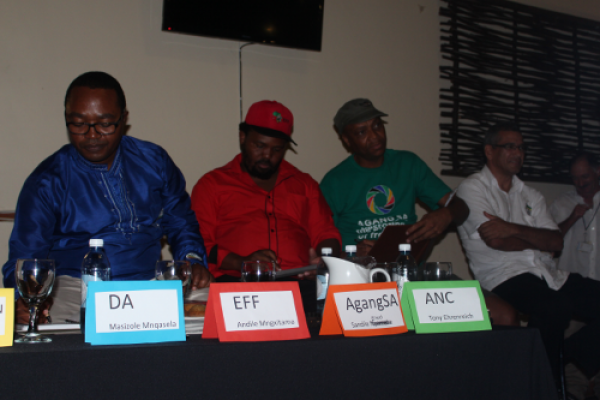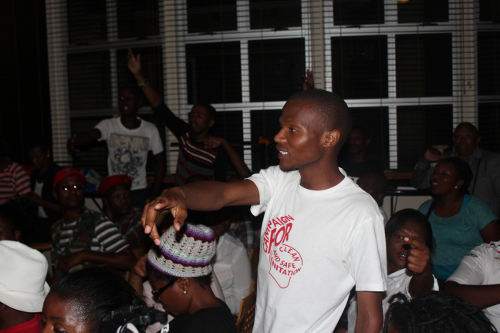

Representatives of the political parties at last night’s debate. Photo by Craig Oosthuizen.
11 April 2014
On April 10, at Lookout Hill, Khayelitsha, representatives of the ANC, DA, EFF, and Agang SA spoke about their parties’ policies. But the debate ended, before many questions could be asked.
The panel consisted of one member from each party. The debate was hosted by Ndifuna Ukwazi and Equal Education.
Some of the parties seem to have mobilised more heavily than others, with half of the audience dominated by DA and EFF colours, while ANC T-shirts were noticeably absent.
During the debate, each party was asked to introduce their policies and their plans to improve sanitation (especially in informal settlements), policing, gang violence in and around schools, and youth employment.
All the parties agreed that everyone deserves safe and dignified sanitation. Masizole Mnqasela (DA) said that the DA-led government in Cape Town spent 76% of its budget on the poor, and had been successful in ensuring that all people in the city had access to sanitation. This resulted in angry shouts of “go home” from some members of the audience.
He went on to claim that since taking over from the ANC in Cape Town in 2009, the DA has supplied over 40 000 full flush toilets to communities.
Tony Ehrenreich (ANC) disputed this claim and criticised the DA’s solutions, such as providing portable toilets through contractors.
Sandile Eland (Agang) said that the DA preferred to impose its solutions on communities, rather than going to the ‘grassroots’ to get solutions from the people.
But none of the parties provided any clear vision or specific steps on how they would deal with inadequate sanitation in informal areas.
Both Eland and Ehrenreich spoke about the serious effects of gangsterism on the youth. Eland pointed out that fear of gang violence prevents many learners from attending school, robbing the country of the business people of tomorrow. Ehrenreich accused the Western Cape DA government of doing nothing to solve the problem of gangsterism in schools and townships, while Mnqasela accused the ANC of politicising crime.
Eland claimed both the ANC and DA were playing politics while people were dying daily. He said that Agang would press for the police to establish units that would be specifically trained to deal with the issue of gangsterism.
Andile Mngxitama (EFF) stressed that youth get involved in crime and violence because they have lost hope, and that hope could only be restored by providing them with good education and jobs.
According to Mnqasela, the DA aims to reduce crime by ensuring that 250 000 police officers are on the street every day. Ehrenreich also called for more police in the townships.
The parties varied significantly in their stance to police corruption. Mngxitama’s said the police are corrupt and are trained to oppress black people. He claimed that the ANC-controlled police service had killed one in ten black people involved in service delivery protests.

Axolile Notywala of the SJC speaks from the floor. Photo by Craig Oosthuizen.
Eland and Ehrenreich countered by stating that while there are a few police officials doing wrong, not all police officers are corrupt. According to Ehrenreich, it doesn’t serve any purpose to condemn the police. Instead, he said, we should work with honest police officers and expose those that are corrupt. He went on to say that while the wealthy in areas like Constantia can afford private security to keep them safe, people in the townships often only have the police to rely on.
Eland said that the police sometimes forget that they are civil servants, and need education. They should be working with communities to find solutions.
All parties agreed education was crucial to reduce youth unemployment. Mnqasela said that schools should accept learners regardless of background, whether they are rich or poor. He also said that learners should be given food. He said that the EFF would press for free education for all, and that all EFF parliamentarians would be forced to enrol their children in public schools because this was the only way to ensure the quality of education in public schools.
Eland said Agang would also call for free education, from preschool to university, and that it saw skills development as key to increasing youth employment. Eland proposed shutting down the Sector Education and Training Authorities (SETAs), because Agang believes it would be more effective to give money directly to businesses in order to encourage them to train young people.
Mngxitama proposed offering young people two-week training courses to teach them how to build houses. At the same time they would gain valuable job skills.
In questions from the audience, Axolile Notywala, an activist from the Social Justice Coalition, expressed disappointment that Ehrenreich had kept quiet on the R256 million that government spent on improving President Jacob Zuma’s house in Nkandla when there are many people who don’t have houses.
He also criticized the DA for being uneducated about the real provision of sanitation, and making false statements regarding the number of toilets in Khayelitsha.
The DA supporters were shouting that they wanted the microphone. Lisa Tuthiywe, a community member from Khayelitsha who was wearing a DA shirt, said that the event was interesting and educational, but felt that the DA members of the audience were not allowed to ask questions.
Question time was cut short because the moderator had to ask the DA supporters to leave the venue, effectively ending the debate.
There was tension toward the end of the meeting. Photo by Craig Oosthuizen.
Craig Oosthuizen works for Ndifuna Ukwazi, a non-profit social justice organisation that supports community activism for justice and equality through evidence and use of law. Equal Education is a movement of parents, teachers and learners working for quality and equality in South African education through analysis and activism.